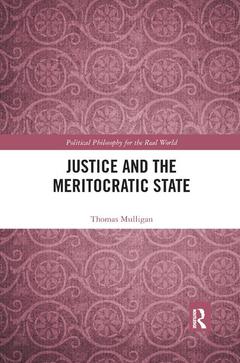Description
Justice and the Meritocratic State
Political Philosophy for the Real World Series
Author: Mulligan Thomas
Language: English
Subjects for Justice and the Meritocratic State:
Keywords
Top Marginal Income Tax Rate; Meritorious Applicant; Justice and the Meritocratic State; Desert Basis; justice; Current Social Welfare System; economic justice; Young Man; John Rawls; Child’s Future Ability; Robert Nozick; Luck Egalitarian; political philosophy; Meritocratic Hiring; egalitarianism; Equal Opportunity Framework; libertarianism; Meritorious Contributions; meritocracy; Meritocratic Framework; equality; Desert Object; liberty; Meritocratic Ideal; David Miller; Reflective Equilibrium; George Sher; Violate; Thomas Piketty; Average Income; distributive justice; Formal Eo; intuition; Internal Revenue Service; consequences; Deserved Income; capital; Ceo Pay; desert; Good Life; desert-based theory of justice; Cotton Top Tamarins; A Theory of Justice; PVT; Anarchy; Aboutness Principle; State; and Utopia; Capu Chin Monkeys; essentialism; personal identity; meritocratic public policy; tax theory; inheritance tax; social spending; equal opportunity; nepotism; cronyism; public policy; Thomas Mulligan
Approximative price 50.12 €
In Print (Delivery period: 14 days).
Add to cartPublication date: 07-2019
· 15.2x22.9 cm · Paperback
Publication date: 12-2017
· 15.2x22.9 cm · Hardback
Description
/li>Contents
/li>Readership
/li>Biography
/li>
Like American politics, the academic debate over justice is polarized, with almost all theories of justice falling within one of two traditions: egalitarianism and libertarianism. This book provides an alternative to the partisan standoff by focusing not on equality or liberty, but on the idea that we should give people the things that they deserve.
Mulligan sets forth a theory of economic justice?meritocracy?which rests upon a desert principle and is distinctive from existing work in two ways. First, meritocracy is grounded in empirical research on how human beings think, intuitively, about justice. Research in social psychology and experimental economics reveals that people simply don?t think that social goods should be distributed equally, nor do they dismiss the idea of social justice. Across ideological and cultural lines, people believe that rewards should reflect merit. Second, the book discusses hot-button political issues and makes concrete policy recommendations. These issues include anti-meritocratic bias against women and racial minorities and the United States? widening economic inequality. Justice and the Meritocratic State offers a new theory of justice and provides solutions to our most vexing social and economic problems. It will be of keen interest to philosophers, economists, and political theorists.
Part I: On Justice 1. Why Meritocracy? 2. The Metatheory of Justice 3. What We Believe about Justice 4. The Concept of Desert Part II: A Meritocratic Theory of Economic Justice 5. On the Distribution of Income 6. On the Distribution of Jobs 7. Defending Desert from the Left and the Right Part III: Meritocratic Public Policy 8. Public Spending and the Establishment of Equal Opportunity 9. Meritocratic Tax Theory 10. Justice in Our Lifetimes
Thomas Mulligan is a Junior Faculty Fellow at Georgetown University's Institute for the Study of Markets and Ethics. Before coming to academia, he served in the U.S. Navy and the Central Intelligence Agency.




